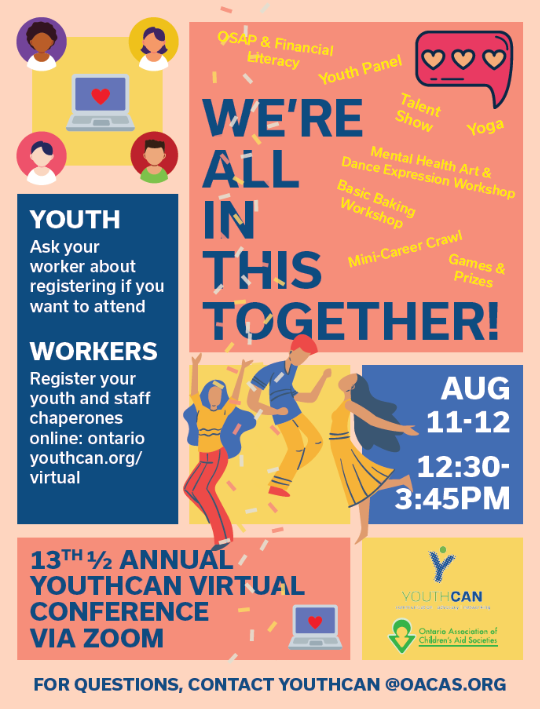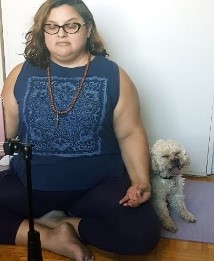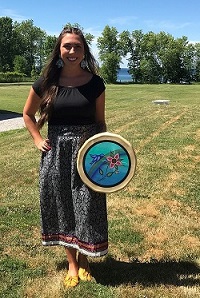 Since 2006, the Ontario Association of Children’s Aid Societies (OACAS) has organized an annual YouthCAN Conference, with the goal of exposing youth in care to post-secondary options and career opportunities, as well as building valuable life skills through communication, advocacy, and networking. This year, to respect preventative measures to reduce the spread and transmission of COVID-19, the annual YouthCAN Conference went virtual!
Since 2006, the Ontario Association of Children’s Aid Societies (OACAS) has organized an annual YouthCAN Conference, with the goal of exposing youth in care to post-secondary options and career opportunities, as well as building valuable life skills through communication, advocacy, and networking. This year, to respect preventative measures to reduce the spread and transmission of COVID-19, the annual YouthCAN Conference went virtual!
The entire conference, which took place August 11-12, was held on Zoom video platform. Although the in-person elements of the conference were deeply missed, the virtual model meant that more youth were able to participate, especially those who have found the traditional format too overwhelming and/or inaccessible. This year there were also two American Sign Language (ASL) interpreters present throughout conference.
OACAS would like to thank immensely the YouthCAN team (Taïna Mayberry, Yessinia Vasquez, Mary Polgar) who planned and delivered this event in collaboration with YouthCAN Champions (Children’s Aid Society staff) and members of the OACAS Youth for Change Steering Committee, which is comprised of young people from care.
OACAS playfully called this the 13 ½ Annual YouthCAN Virtual Conference. This is because while activities were similar to past conferences, we recognized that the change to an online format meant things were being done differently. Based on registration numbers, 173 youth and 61 CAS staff from 33 Children's Aid Societies and Indigenous Child and Family Well-Being Agencies attended the 2020 YouthCAN conference.
This year’s theme was We’re All in This Together! which reflected the idea that although participants are currently physically distanced, they are still united as a community. Through this theme, the conference focused on activities that connected everyone to shared goals of mental health self-care, skill-building, school/career, and future financial planning. Participants engaged in eight workshops and highly interactive group activities focused on these four areas. There were also several energetic games with prizes played throughout both conference days, mini-video presentations, a talent show for participants to show off their skills and a mindfulness activity including smudging with sage.
Conference Highlights
Mini-Career Crawl: A tradition of the YouthCAN Conference is a trade show format Career Crawl, where participants talk to a range of professionals about their career and career path. This year, the virtual conference allowed for a more intimate format through which four young adults from care spoke about the impact being from the child welfare system had on their career path, strategies to choosing post-secondary education, finding employment that reflected their authentic identity, including Indigenous culture, and balancing school with other responsibilities such as motherhood and mental health self-care.
Youth from Care Panel: Similar to past Conferences, this year’s agenda included a youth from care panel through which a group of five young people interacted with participants and shared their strategies for coping with COVID-19, how to reduce the negative impact of isolation, and what it means to re-connect to culture, including Indigenous and African community.
Graduation Recognition: A portion of the conference was allotted to recognizing participants who were unable to attend an in-person school graduation due to COVID-19. Led by ‘virtual’ Valedictorian, Conner Lowes (OACAS Youth for Change Steering Committee member), participants listened to a graduation speech and song to celebrate their successes as the graduating class of 2020.
Select Workshop Leaders
-

- Micaela (Certified RYT 200 Hatha Yoga Teacher) facilitated a relaxing meditation that reflected her passion for LGBTQS+ rights, body positivity, and self acceptance.
-

- Kiaunna and Conner (OACAS Youth for Change Steering Committee) taught participants how to bake cake in a mug with their entertaining, educational, and hands-on workshop.
-

- Hayley (Cultural Resource Advisor- Central Region, Dnaagdawenmag Binoojiiyag Child & Family Services) led participants in a mindfulness activity including smudging with sage.
Conference Evaluation Results
The success of this year’s conference was reflected strongly in participant evaluations which showed that 90% of child welfare agency staff and 86% of youth rated their overall experience as either very satisfied or satisfied. As well, 80% of youth who answered the survey self-identified as belonging to one or more identity group (i.e., racialized minority, Indigenous/First Nations/Métis, LGBTQ+, living with a disability, gender non-binary, gender fluid). However, it’s important to note that this year’s sample size was small, which likely contributed to the significant increase over last year (23%).
Conference evaluation comments illustrated the following positive youth outcomes:
- Better understanding of financial literacy, post-secondary options and OSAP
- Greater sense of resiliency and reduced isolation through shared experiences
- Improved strategies to succeeding in online school during COVID-19
- Increased knowledge of community resources including identity/cultural services
- Enhanced understanding of mental health coping activities including meditation, dance, journaling, cooking and visual art!
Testimonials
The Indigenous representation and land acknowledgement were why YouthCAN Conference was a positive experience this year.
I think conference gave me the opportunity to meet new people (virtually) that may have went through similar situations as me and also it helped to learn more about OSAP and financial literacy.
Thank you so much 🙂 best 2 days ever
YouthCAN was very fun and it opened up my mind on why I should look at the world with a different perspective
YouthCAN Conference was a positive experience this year because of the sharing from other youth, the positivity from the presenters, the career crawl.
It was great to see youth still connect even though they didn't see each other. The support among them was still there and felt by many.
The best part was seeing youth open up to the hosts and to each other in a safe, supportive environment.
They made the best of an unfortunate situation, I found it insightful, engaging with really meaningful advice and inspiration for the youth.
I want you to know that this [virtual conference] is great for my youth that do suffer from anxiety - this is a great first experience for them.
We know that the COVID-19 pandemic is having particularly negative impacts for youth in and from care. These young people were already dealing with significant challenges, including mental health, social isolation, and financial stresses before the pandemic hit. Which is why events like the YouthCAN Conference are so critical. These young people need to understand that they are part of a community that cares of them, that they can reach out for support, and that they are never alone. We just hope we get a chance to remind them in-person next year!